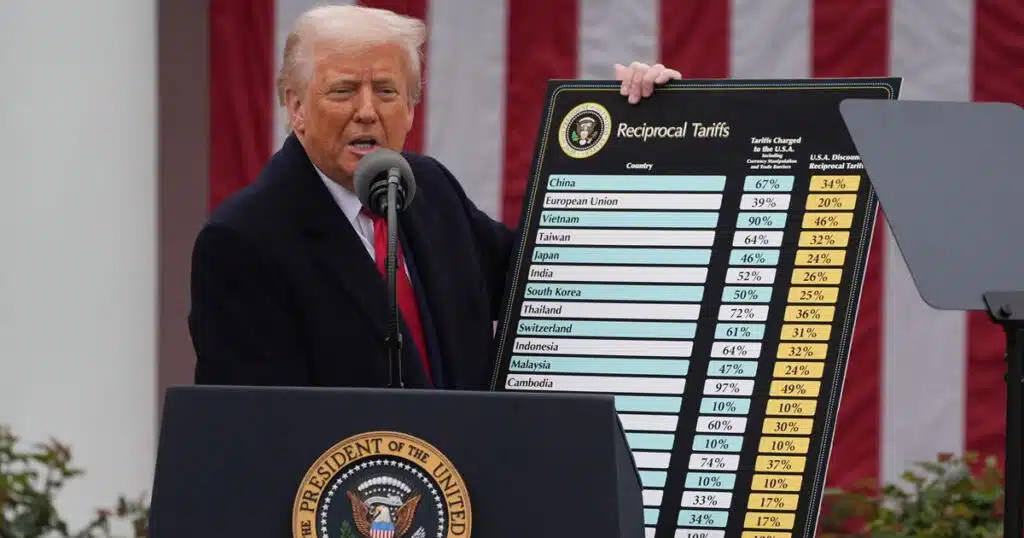
Tennessee Mayor’s ‘Hate’ Council Strategized With Far-Left Group Demonizing Moms for Liberty
Tennessee’s third-largest city launched a council to oppose “hate” and “extremism” in 2018, and that council has repeatedly collaborated with the far-left Southern Poverty Law Center, which is notorious for branding mainstream conservative and Christian nonprofits “hate groups,” putting them on a “hate map” alongside the Ku Klux Klan.
Then-Chattanooga Mayor Andy Berke, a Democrat, launched the Council Against Hate in 2018. In doing so, he referenced a July 2015 shooting in the Tennessee city.
“A city of creators will find new ways to combat hatred, especially when it leads to violence and tears apart the social fabric of our community,” Berke said. “After July 16, 2015, our city was held up as a model of how to respond to terrorism. We can also be a model of how to stop the hate that inspires it in
the first place.”
Yet, the Council Against Hate does not seem focused on the radical Islamist ideology that likely motivated Muhammad Youssef Abdulazeez, the man who opened fire on two military installations in the July 2015 shooting, ultimately killing five service members and wounding two others.
Although then-FBI Director James Comey did not cite radical Islamism, he did state that “foreign terrorist organization propaganda” inspired the shootings. Abdulazeez spent months traveling throughout the Middle East the year before the shooting. Rep. Michael McCaul, R-Texas, the chairman of the House Homeland Security Committee, said, “My judgment is that this was an ISIS-inspired attack.”
Rather than focusing on radical Islamism, the Chattanooga council repeatedly enlisted the Southern Poverty Law Center, which focuses on “hard-right extremists,” according to documents obtained by The Daily Signal through the Tennessee Open Records Act.
According to the documents, the Council Against Hate hosted meetings with SPLC staff on Aug. 28, 2018, and three times in 2020: July 16, Aug. 19, and Oct. 22.
“As a reminder, Chattanooga Mayor Andy Berke’s Council Against Hate would like to hear more about the work of the SPLC, as well as any trends or statistics in hate crime and/or hate speech that the SPLC is observing that might be relevant to the work of the Mayor’s Council Against Hate,” the August 2018 conference call description reads. “Any advice and guidance the SPLC could provide to help the Council craft its priorities and areas of focus would be greatly appreciated.”
Lecia Brooks, then SPLC’s director of outreach and now the chief of staff, organized the call. Brandon Jones, SPLC’s director of political campaigns, organized the 2020 calls. The Aug. 19 call took place over Zoom, and Jones said he would add “5 more people max.”
Kerry Hayes, who served as Berke’s deputy chief of staff and then as chief of staff starting in January 2020, organized the calls. (Hayes has since left the mayor’s office.)
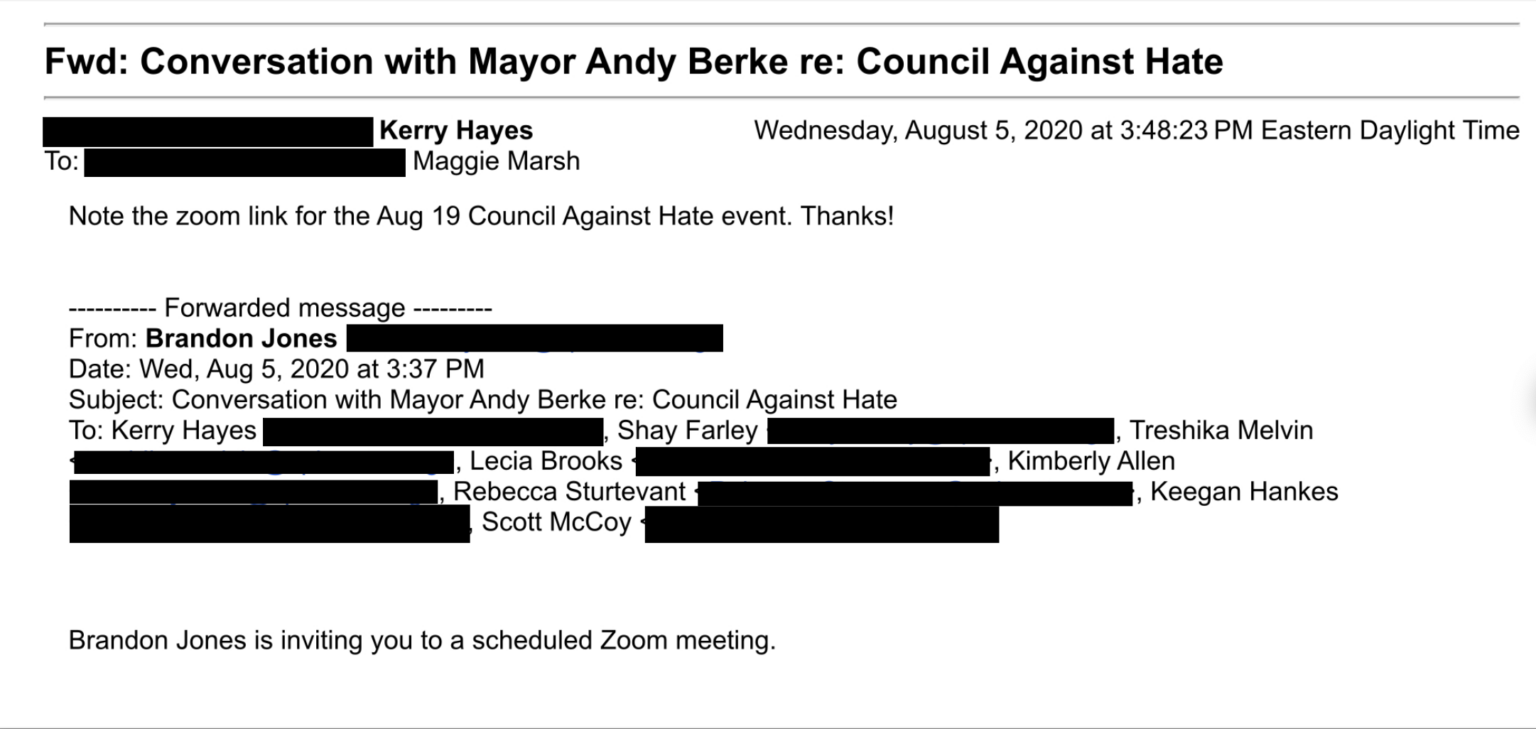
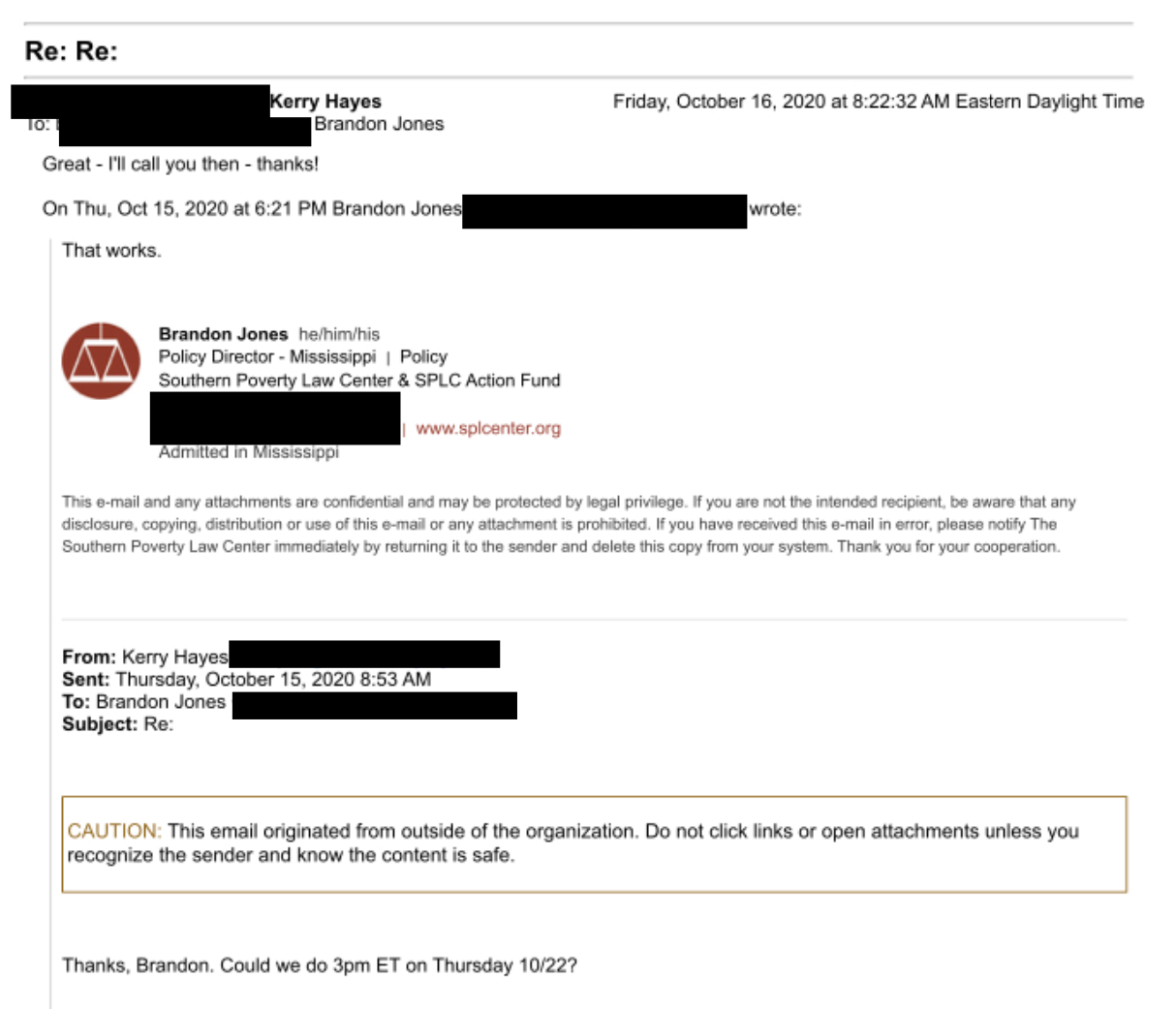
On Dec. 18, 2019, Hayes conducted a podcast interview with Heidi Beirich, who led the SPLC’s Intelligence Project at the time. The SPLC’s Intelligence Project — which began as “Klanwatch” — maintains the organization’s lists of “hate groups” and “anti-government extremist groups,” which the SPLC plots on a map with Klan chapters.
The “hate map” includes mainstream conservative and Christian organizations, immigration-control groups, such as the Center for Immigration Studies (which the SPLC brands “anti-Muslim”); religious freedom organizations, such as Alliance Defending Freedom and the Family Research Council (which the SPLC brands “anti-LGBTQ”); and parental rights groups, such as Moms for Liberty, among others. Critics have also faulted the SPLC for inflating the numbers of “hate groups” as a fundraising tactic. As I wrote in my book “Making Hate Pay,” a former SPLC employee called the “hate” accusations a “highly profitable scam,” and the “hate map” inspired a terrorist attack in 2012.
The Beirich interview demonstrates that Berke continued to work with the SPLC and considered the organization a reliable source, even after a March 2019 scandal in which the SPLC fired its co-founder amid claims of racial discrimination and sexual harassment.
During the interview—which remains available on platforms, such as Podbay—Beirich noted that Amazon’s charity-donation platform Amazon Smile used the SPLC’s list of “hate groups” to exclude organizations.
“The newest use of the list, really, in recent years, have been, for example, by tech companies, who use this list to screen hateful material off of their websites,” Beirich said. “Amazon has a matching-funds program that anybody can join who buys stuff on Amazon. It’s called Amazon Smile… and they don’t allow donations to groups that are on our list.”
She admitted that “more and more hate groups don’t really exist in the real world and just exist in cyberspace.”
Yet Beirich also claimed that “white supremacy” has started to motivate government policies, and she tied it to other issues that do not involve race.
“It’s almost as though we have to talk about white supremacy more … because it’s becoming not just the font of most domestic terrorism in the Western world, but it’s something that’s starting to motivate policies, anti-immigrant, anti-Muslim, anti-LGBTQ policies, and it’s something that poses a threat for hate crimes, and law enforcement absolutely has to know where these organizations are and what they’re up to,” she said.
“The nature of tracking white supremacy is changing and also the list of groups is a component of the levels of white supremacy and other forms of bigotry,” she added.
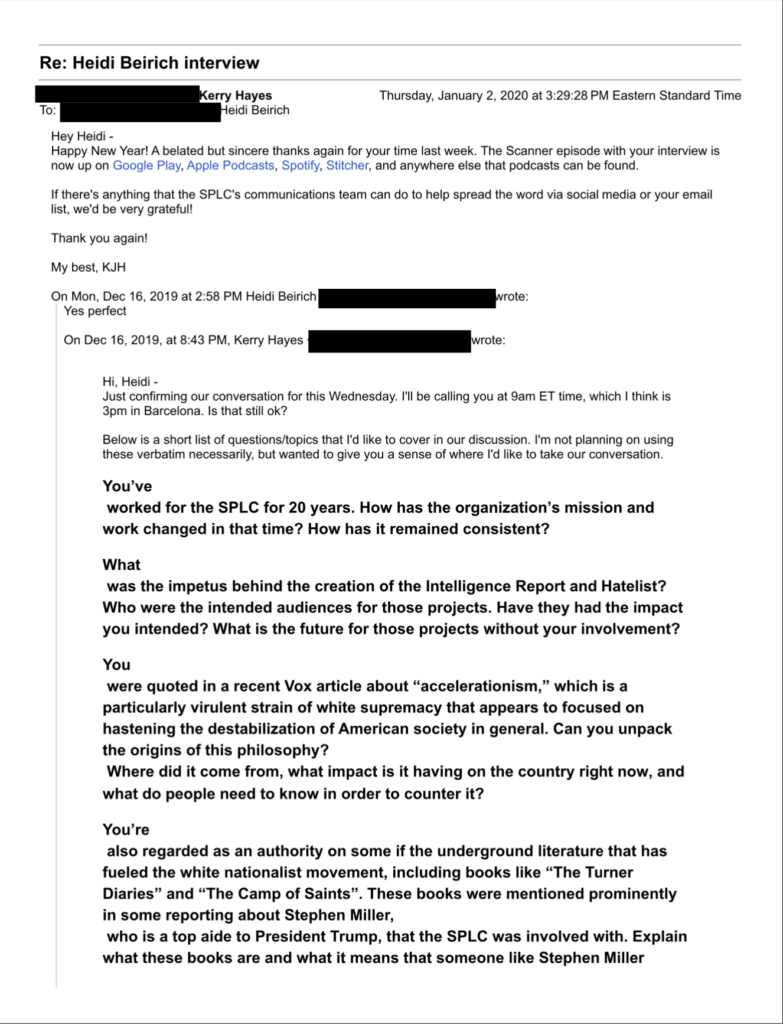
Jermaine Freeman, then Chattanooga’s economic development officer, reached out to the SPLC’s Brooks, requesting a presentation on “hate groups that are in our area.”
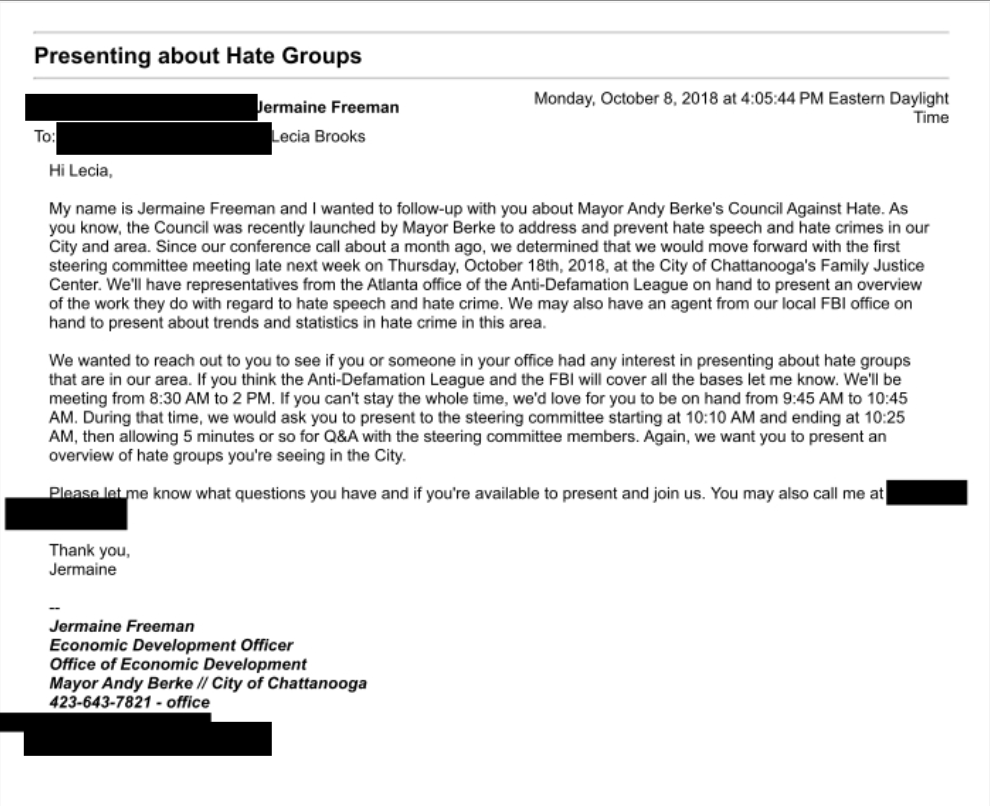
The Council Against Hate’s outreach to the SPLC suggests a left-leaning approach to “hate” that smears conservatives and Christians.
Berke left office on April 19, 2019. Tim Kelly, the new, politically Independent mayor, appointed Jermaine Freeman his interim chief of staff on May 5. Kelly did not keep Hayes, however.
Kelly did not respond to The Daily Signal’s request for comment on whether the Council Against Hate has continued to work with the SPLC during his tenure and whether he considers the SPLC a reliable source on “hate.”
Berke, whom President Joe Biden appointed director of the Rural Utilities Service at the Department of Agriculture, did not respond to a request for comment.
Neither Hayes, now principal at Coeo Public Affairs, nor the Southern Poverty Law Center responded to a request for comment.
The Council Against Hate released a report on April 11, 2019, outlining various strategies for combating hate.
“The vision of the Mayor’s Council Against Hate is for the greater Chattanooga area to be known as the most civil, safe, and welcoming community in the country that honors freedom of expression, protects marginalized populations, and regards the diversity of faiths, ethnicities, genders, and viewpoints as an essential strength,” the report states.
The report presents eight strategies, including changing public policy to protect “targeted constituencies from hate crimes and violent extremism”; defining “hate,” working with schools to lead students away from “hate”; encouraging businesses to combat “hate”; and developing a “rapid response” committee to promote “media literacy” around “hate speech.”
While those efforts seem noble on the surface, if the Council Against Hate adopts a view of hate that reflects that of the Southern Poverty Law Center, it might amount to ideological tests that exclude conservative and Christian viewpoints as “hateful.”
The document even suggests a pledge for students.
“Challenge every student in Hamilton County’s public schools to sign a pledge in which they
commit to living a life free of hate,” the council suggests. “Using ‘signing ceremonies’ as public engagement opportunities to speak to them about the importance of kindness, civility, and compassion.”
Conservatives and Christians support kindness, civility, and compassion, but if the committee uses the SPLC’s approach in drafting such a pledge, it may force students to pledge to oppose conservative principles.


